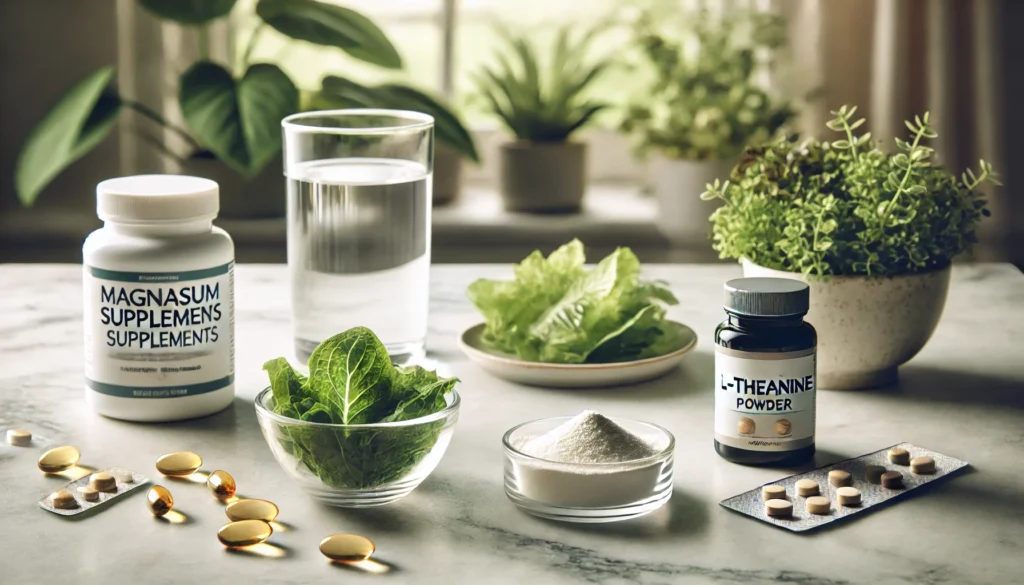In our fast-paced world, stress and anxiety are common. Many turn to pharmaceutical aids like Valium for relief.
Valium, or diazepam, is a potent medication. It’s often prescribed for anxiety, muscle spasms, and seizures.
However, concerns about dependency and side effects have many seeking alternatives. This has led to a surge of interest in natural substitutes for Valium.
These natural alternatives aim to offer similar calming effects. The goal is to alleviate anxiety and promote relaxation without the risk of addiction or adverse reactions.
Herbal remedies, nutritional supplements, and lifestyle interventions are all part of this natural arsenal. They have been used for centuries to combat stress and anxiety.
This article will delve into these natural alternatives. We’ll explore herbs like chamomile and lavender, supplements like magnesium and L-theanine, and lifestyle changes that can help manage anxiety.
Whether you’re a health coach, a science journalist, or a biohacker, this comprehensive guide is for you. It’s time to explore the world of natural alternatives to Valium.
You may also like: Top Supplements to Alleviate Anxiety Naturally

Understanding Valium and Its Effects
Valium, a well-known brand of diazepam, belongs to a group of drugs called benzodiazepines. This class of medication is frequently used to calm anxiety and treat several conditions. While effective, its use is not without risks.
Benzodiazepines work by enhancing the effects of gamma-aminobutyric acid (GABA), a neurotransmitter in the brain. Increased GABA activity results in a calming effect, which can effectively reduce anxiety. However, this powerful impact has a downside.
Over time, the brain can become accustomed to the presence of Valium, leading to dependency. This dependency is not only physical but also psychological. Users might find it challenging to manage anxiety without the drug, which makes withdrawal difficult and potentially dangerous.
Apart from dependency, Valium’s list of side effects is extensive:
- Drowsiness and fatigue
- Memory impairment
- Dizziness or lightheadedness
- Muscle weakness
- Coordination problems
These side effects can interfere with daily life. Tasks such as driving or operating machinery can become hazardous. Thus, alternatives that provide relief without such drawbacks are appealing.
In summary, Valium is an effective but potentially risky solution for anxiety. Understanding its mechanism and drawbacks is crucial. This awareness underscores the importance of exploring natural options for managing anxiety.
The Search for Natural Valium Substitutes
In the quest for alternatives to Valium, many turn to nature’s pharmacy. Natural remedies are often seen as safer options due to their historical use and fewer side effects. This has led to increased interest in herbal solutions for anxiety relief.
A wide array of plants and supplements claim to mimic the calming effects of Valium. These options offer a way to manage stress without the dependency risks associated with pharmaceuticals. The focus is on finding natural compounds that support mental wellness gently and effectively.
Understanding which natural remedies are most effective is vital. Herbal and nutritional alternatives often work subtly, providing cumulative benefits. By exploring these options, individuals can tailor their approach to anxiety management, aiming for balance and harmony in the body’s stress response system. With the growing trend of holistic health practices, such exploration is both timely and promising.
Herbal Remedies for Anxiety and Stress Relief
Herbal remedies have long been cherished for their calming effects. Known for their gentle approach, they offer relief without harsh side effects.
These plants can influence neurotransmitters in the brain. By doing so, they help balance mood and ease anxiety symptoms.
Ancient cultures recognized the soothing properties of herbs. Their wisdom continues to guide us today.
Various herbs serve as natural substitutes for Valium. Each has unique properties that contribute to mental peace.
Here are some popular herbal remedies for anxiety:
- Chamomile
- Lavender
- Passionflower
- Lemon Balm
- Ashwagandha
- Kava Kava
These herbs work in different ways. Some increase relaxing neurotransmitters, while others calm the body directly.
For optimal results, knowing how to use these herbs matters. Dosage, preparation, and method of intake all play a role.
Herbal remedies often have a cumulative effect. Consistent use leads to gradual, steady improvements in mental well-being.
Some herbs are consumed as teas, while others are taken as supplements. Choosing the right form can enhance their effectiveness.
Many people experience benefits with these natural solutions. They find them ideal for promoting relaxation and reducing stress.
While generally safe, potential interactions with medications should be considered. Consulting a healthcare provider is wise.
This personalized approach can foster a holistic sense of wellness. With patience and proper guidance, herbal remedies can be a valuable ally. Their natural essence offers a balanced way to manage life’s pressures.
Chamomile: A Gentle Sedative
Chamomile is a favorite among herbalists for its soothing properties. Known as a gentle sedative, it helps ease anxiety.
Often found in teas, chamomile is simple to use. Drinking it before bed can enhance sleep and relaxation.
Its calming effect is due to apigenin, a compound that binds to brain receptors. This action promotes a mild sensation of tranquility.
Lavender: Soothing Aromatherapy
Lavender is renowned for its delightful scent and calming effects. Used widely in aromatherapy, it soothes both mind and body.
Inhaling lavender oil can reduce stress levels. It invokes a sense of calm and can even aid in achieving restful sleep.
The herb’s anxiolytic properties are well-documented. This makes it a popular choice for natural anxiety relief.
Passionflower: Boosting GABA Naturally
Passionflower is a vibrant herb with powerful effects on the brain. It works by boosting levels of gamma-aminobutyric acid (GABA).
Higher GABA levels lead to better anxiety control. Passionflower can help to maintain focus while calming nerves.
Beyond anxiety, this herb is used to treat insomnia. It’s versatility makes it a wonderful natural calming agent.
Lemon Balm: Mood Enhancer
Lemon balm is celebrated for its mood-enhancing abilities. The mild lemon scent accompanies uplifting effects.
It’s effective in alleviating tension and promoting mental clarity. As a result, lemon balm is ideal for stress management.
When taken as a tea or supplement, it can gradually improve mood. Its soothing essence allows for a peaceful state of mind.
Ashwagandha: The Stress-Resisting Adaptogen
Ashwagandha is an adaptogen that bolsters the body’s ability to handle stress. This ancient herb enhances resilience and balances stress responses.
Studies show it can reduce cortisol, the stress hormone. Consequently, Ashwagandha decreases anxiety symptoms over time.
This herb’s adaptogenic nature supports sustained energy without stimulating the nervous system. It fosters a grounded, calm state.
Kava Kava: The Pacific Elixir
Kava Kava comes from the South Pacific, where it’s used for its sedative effects. Often consumed in cultural ceremonies, it’s valued for its ability to induce relaxation.
Its active compounds, kavalactones, have direct calming effects. Kava has become popular as a natural anxiety relief option.
With potential to reduce stress and enhance tranquility, Kava Kava is a potent herbal remedy. However, users should heed recommended dosages due to liver considerations.

Nutritional Supplements for Anxiety
Nutritional supplements offer valuable support for anxiety management. By nourishing the body, they can enhance mood and mitigate stress.
These supplements may address deficiencies that influence mental health. Balanced nutrition is vital for maintaining a healthy nervous system.
Here are some beneficial supplements for anxiety:
- Magnesium
- L-theanine
- Omega-3 fatty acids
- B Vitamins
Magnesium is known for its relaxation properties. L-theanine, an amino acid in tea, calms the mind and improves focus.
Omega-3 fatty acids are vital for brain health. They play a crucial role in regulating mood.
B Vitamins support overall nervous system function. They help the body manage stress and maintain energy levels.
Probiotics may also impact mental health. The gut-brain axis connects digestion with mood regulation.
Regular intake of these nutrients can lead to noticeable improvements. Mental clarity and emotional stability often follow.
Nutritional supplements work best when combined with a healthy diet. Foods rich in these nutrients bolster their effects.
Careful selection and consistent use are essential. Always consult a healthcare professional before starting any supplement routine.
Together, these supplements provide a well-rounded approach to anxiety relief. Their potential to enhance mental wellness is invaluable.
Magnesium: The Relaxation Mineral
Magnesium is an essential mineral known for its calming impact. It aids in muscle relaxation and supports a healthy nervous system.
Stress can deplete magnesium levels. Replenishing this mineral can help reduce anxiety and promote restful sleep.
Found in foods like spinach and almonds, magnesium can also be taken as a supplement. It’s a simple yet effective way to ease tension.
L-theanine: Tea’s Calming Compound
L-theanine is a naturally occurring amino acid in tea. It’s prized for its ability to induce relaxation without causing drowsiness.
This compound can enhance brain function by increasing alpha waves. This state is linked to calmness and improved concentration.
Adding L-theanine to one’s diet can balance stress levels. It’s often paired with caffeine for focused energy without jitters.
Omega-3s: Brain Health and Mood
Omega-3 fatty acids are crucial for maintaining brain health. They contribute to the structure and function of brain cells.
These healthy fats are found in fish and flaxseeds. Incorporating them can improve mood and cognitive function.
Research indicates that omega-3s can reduce anxiety symptoms. They support emotional stability and overall mental well-being.
B Vitamins: Nervous System Support
B Vitamins play a central role in nervous system health. They assist in producing neurotransmitters that regulate mood.
A deficiency in B Vitamins can lead to increased stress levels. Supplementing these vitamins helps in managing anxiety.
Foods like whole grains and legumes are rich in B Vitamins. Ensuring adequate intake supports mental health and energy production.
Lifestyle Interventions for Natural Anxiety Relief
Lifestyle changes can significantly reduce anxiety. They work hand-in-hand with supplements for holistic relief.
Incorporating healthy habits fosters mental wellness. These interventions are accessible and effective for everyone.
Key lifestyle interventions include:
- Regular exercise
- Mindfulness and meditation
- Cognitive-behavioral techniques
- Adequate sleep
Exercise releases endorphins, lifting mood naturally. Physical activity is a powerful, accessible anxiety remedy.
Mindfulness and meditation cultivate present-moment awareness. These practices reduce stress and enhance emotional resilience.
Cognitive-behavioral techniques (CBT) help restructure thoughts. Addressing negative patterns can alleviate anxiety symptoms.
Sleep is vital for emotional regulation. Natural sedatives and sleep hygiene support restorative rest.
Hydration and nutrition also play roles. A balanced diet complements these lifestyle interventions.
Social support networks are critical. Connecting with others helps manage stress and anxiety levels.
Spending time in nature can soothe the mind. Nature’s calming effect is a valuable anxiety relief tool.
Combining these interventions can enhance their effects. Experimenting to find the right balance is key.
Exercise: The Natural Mood Booster
Exercise acts as a natural anxiety suppressant. Physical activity boosts endorphin levels, alleviating stress.
Activities like walking or cycling can elevate mood. They also promote overall well-being and mental clarity.
Regular exercise builds resilience to stress. It’s a proactive strategy for maintaining emotional balance.
Mindfulness and Meditation: The Power of Presence
Mindfulness involves being present in the moment. It helps reduce anxiety by focusing on current experiences.
Meditation cultivates this awareness through stillness. Both practices enhance self-understanding and emotional stability.
Engaging in mindfulness can change one’s stress response. It’s a simple but profound way to manage anxiety.
Cognitive-Behavioral Techniques: Rewiring Thoughts
Cognitive-behavioral techniques transform negative thought patterns. They address the root causes of anxiety.
By altering distorted thinking, CBT reduces stress. This approach empowers individuals to cope more effectively.
Learning to recognize and adjust thoughts takes practice. However, the benefits are long-lasting and impactful.
Sleep and Natural Sedatives: Restorative Rest
Restful sleep is essential for emotional health. It provides the brain with time to recover and regenerate.
Natural sedatives support this process. Using herbs like valerian root can improve sleep quality.
Proper sleep hygiene is vital. Creating a calming bedtime routine enhances the effect of natural sedatives.

Safety and Considerations When Using Natural Sedatives
Natural sedatives offer a softer alternative to pharmaceuticals. However, safety must remain a priority in their use.
Each herb or supplement can interact with medications. It’s crucial to consult a healthcare professional before beginning any regimen.
Dosing with natural remedies requires caution. Appropriate dosages can vary based on individual health needs and contexts.
Quality and sourcing of herbal supplements are vital. Choosing reputable brands ensures safety and efficacy.
Potential side effects, though rare, should be acknowledged. Understanding these can help mitigate any adverse responses.
Monitoring the effects of these substances is essential. Pay attention to how your body and mind respond.
Adjusting usage based on personal experience can optimize benefits. Regular check-ins with health providers support this process.
Ultimately, personalized approaches yield the best outcomes. Combining herbs and safety awareness enhances anxiety relief efforts.
The Role of Biohacking in Natural Anxiety Management
Biohacking merges science and self-experimentation to enhance health. It’s a burgeoning field within natural anxiety management. This approach tailors lifestyle changes and supplements to personal needs.
Individuals use biohacking to optimize mental and physical health. Through biofeedback and tracking apps, they monitor anxiety responses. This data guides adjustments in diet, exercise, and supplement use.
Biohackers often focus on natural remedies. They explore herbs like ashwagandha or L-theanine for their calming properties. By observing effects, they refine strategies to better manage anxiety. This exploration combines personal insight with traditional knowledge.
Conclusion: Integrating Natural Alternatives into Anxiety Care
Natural alternatives offer a promising path for anxiety management. They provide support with fewer side effects than pharmaceuticals. A holistic approach blends these remedies with lifestyle changes for better outcomes.
Healthcare professionals and individuals alike can benefit. By understanding natural options, they can craft personalized anxiety care plans. Education and experimentation are key. They empower people to find what works best for their unique needs. Through this journey, a more balanced, sustainable approach to mental health care can emerge.
Further Reading:
Mayo Clinic: Herbal treatment for anxiety: Is it effective?
Healthline: How Valerian Root Helps You Relax and Sleep Better
Medical News Today: How to treat anxiety naturally
Important Note: The information contained in this article is for general informational purposes only, and should not be construed as health or medical advice, nor is it intended to diagnose, prevent, treat, or cure any disease or health condition. Before embarking on any diet, fitness regimen, or program of nutritional supplementation, it is advisable to consult your healthcare professional in order to determine its safety and probable efficacy in terms of your individual state of health.
Regarding Nutritional Supplements Or Other Non-Prescription Health Products: If any nutritional supplements or other non-prescription health products are mentioned in the foregoing article, any claims or statements made about them have not been evaluated by the U.S. Food and Drug Administration, and such nutritional supplements or other health products are not intended to diagnose, treat, cure, or prevent any disease.


